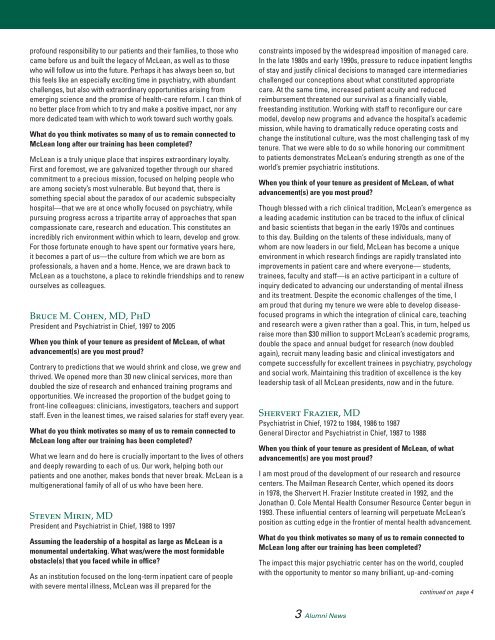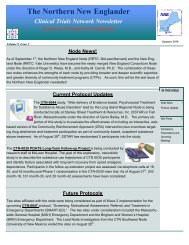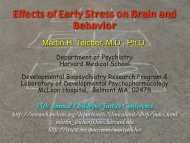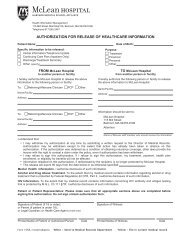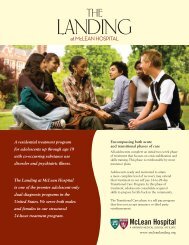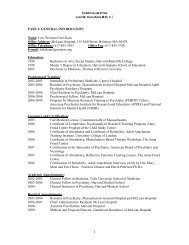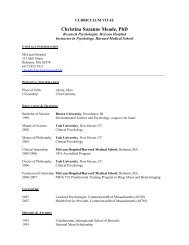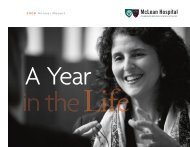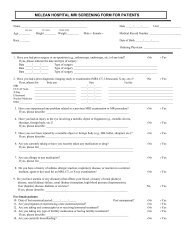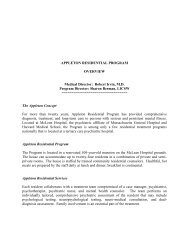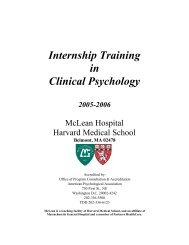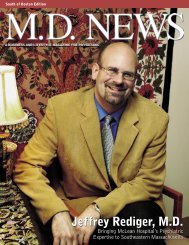Winter 2011 Newsletter - McLean Hospital - Harvard University
Winter 2011 Newsletter - McLean Hospital - Harvard University
Winter 2011 Newsletter - McLean Hospital - Harvard University
Create successful ePaper yourself
Turn your PDF publications into a flip-book with our unique Google optimized e-Paper software.
profound responsibility to our patients and their families, to those who<br />
came before us and built the legacy of <strong>McLean</strong>, as well as to those<br />
who will follow us into the future. Perhaps it has always been so, but<br />
this feels like an especially exciting time in psychiatry, with abundant<br />
challenges, but also with extraordinary opportunities arising from<br />
emerging science and the promise of health-care reform. I can think of<br />
no better place from which to try and make a positive impact, nor any<br />
more dedicated team with which to work toward such worthy goals.<br />
What do you think motivates so many of us to remain connected to<br />
<strong>McLean</strong> long after our training has been completed?<br />
<strong>McLean</strong> is a truly unique place that inspires extraordinary loyalty.<br />
First and foremost, we are galvanized together through our shared<br />
commitment to a precious mission, focused on helping people who<br />
are among society’s most vulnerable. But beyond that, there is<br />
something special about the paradox of our academic subspecialty<br />
hospital—that we are at once wholly focused on psychiatry, while<br />
pursuing progress across a tripartite array of approaches that span<br />
compassionate care, research and education. This constitutes an<br />
incredibly rich environment within which to learn, develop and grow.<br />
For those fortunate enough to have spent our formative years here,<br />
it becomes a part of us—the culture from which we are born as<br />
professionals, a haven and a home. Hence, we are drawn back to<br />
<strong>McLean</strong> as a touchstone, a place to rekindle friendships and to renew<br />
ourselves as colleagues.<br />
Bruce M. Cohen, MD, PhD<br />
President and Psychiatrist in Chief, 1997 to 2005<br />
When you think of your tenure as president of <strong>McLean</strong>, of what<br />
advancement(s) are you most proud?<br />
Contrary to predictions that we would shrink and close, we grew and<br />
thrived. We opened more than 30 new clinical services, more than<br />
doubled the size of research and enhanced training programs and<br />
opportunities. We increased the proportion of the budget going to<br />
front-line colleagues: clinicians, investigators, teachers and support<br />
staff. Even in the leanest times, we raised salaries for staff every year.<br />
What do you think motivates so many of us to remain connected to<br />
<strong>McLean</strong> long after our training has been completed?<br />
What we learn and do here is crucially important to the lives of others<br />
and deeply rewarding to each of us. Our work, helping both our<br />
patients and one another, makes bonds that never break. <strong>McLean</strong> is a<br />
multigenerational family of all of us who have been here.<br />
Steven Mirin, MD<br />
President and Psychiatrist in Chief, 1988 to 1997<br />
Assuming the leadership of a hospital as large as <strong>McLean</strong> is a<br />
monumental undertaking. What was/were the most formidable<br />
obstacle(s) that you faced while in office?<br />
As an institution focused on the long-term inpatient care of people<br />
with severe mental illness, <strong>McLean</strong> was ill prepared for the<br />
constraints imposed by the widespread imposition of managed care.<br />
In the late 1980s and early 1990s, pressure to reduce inpatient lengths<br />
of stay and justify clinical decisions to managed care intermediaries<br />
challenged our conceptions about what constituted appropriate<br />
care. At the same time, increased patient acuity and reduced<br />
reimbursement threatened our survival as a financially viable,<br />
freestanding institution. Working with staff to reconfigure our care<br />
model, develop new programs and advance the hospital’s academic<br />
mission, while having to dramatically reduce operating costs and<br />
change the institutional culture, was the most challenging task of my<br />
tenure. That we were able to do so while honoring our commitment<br />
to patients demonstrates <strong>McLean</strong>’s enduring strength as one of the<br />
world’s premier psychiatric institutions.<br />
When you think of your tenure as president of <strong>McLean</strong>, of what<br />
advancement(s) are you most proud?<br />
Though blessed with a rich clinical tradition, <strong>McLean</strong>’s emergence as<br />
a leading academic institution can be traced to the influx of clinical<br />
and basic scientists that began in the early 1970s and continues<br />
to this day. Building on the talents of these individuals, many of<br />
whom are now leaders in our field, <strong>McLean</strong> has become a unique<br />
environment in which research findings are rapidly translated into<br />
improvements in patient care and where everyone— students,<br />
trainees, faculty and staff—is an active participant in a culture of<br />
inquiry dedicated to advancing our understanding of mental illness<br />
and its treatment. Despite the economic challenges of the time, I<br />
am proud that during my tenure we were able to develop diseasefocused<br />
programs in which the integration of clinical care, teaching<br />
and research were a given rather than a goal. This, in turn, helped us<br />
raise more than $30 million to support <strong>McLean</strong>’s academic programs,<br />
double the space and annual budget for research (now doubled<br />
again), recruit many leading basic and clinical investigators and<br />
compete successfully for excellent trainees in psychiatry, psychology<br />
and social work. Maintaining this tradition of excellence is the key<br />
leadership task of all <strong>McLean</strong> presidents, now and in the future.<br />
Shervert Frazier, MD<br />
Psychiatrist in Chief, 1972 to 1984, 1986 to 1987<br />
General Director and Psychiatrist in Chief, 1987 to 1988<br />
When you think of your tenure as president of <strong>McLean</strong>, of what<br />
advancement(s) are you most proud?<br />
I am most proud of the development of our research and resource<br />
centers. The Mailman Research Center, which opened its doors<br />
in 1978, the Shervert H. Frazier Institute created in 1992, and the<br />
Jonathan O. Cole Mental Health Consumer Resource Center begun in<br />
1993. These influential centers of learning will perpetuate <strong>McLean</strong>’s<br />
position as cutting edge in the frontier of mental health advancement.<br />
What do you think motivates so many of us to remain connected to<br />
<strong>McLean</strong> long after our training has been completed?<br />
The impact this major psychiatric center has on the world, coupled<br />
with the opportunity to mentor so many brilliant, up-and-coming<br />
continued on page 4<br />
3 Alumni News


